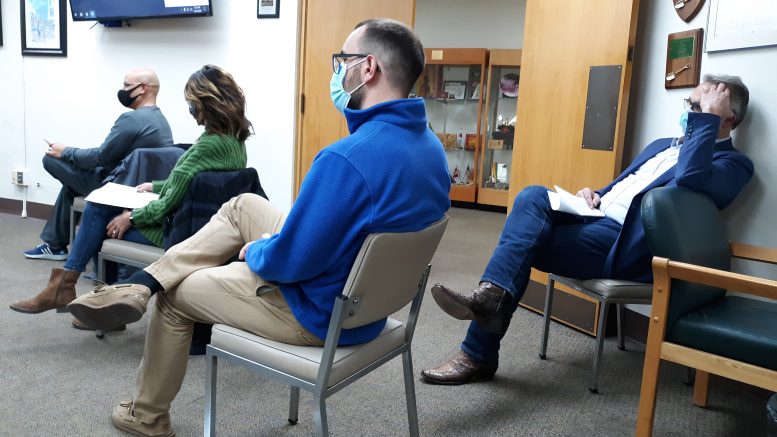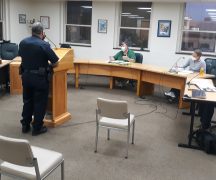By JAN LARSON McLAUGHLIN
BG Independent News
The group charged with bringing visitors to Bowling Green does not want to give up that role or hotel tax revenue.
Board members of the Convention and Visitors Bureau asked Bowling Green City Council Monday evening to reconsider plans to dissolve the group and usurp their ability to attract people to the community.
The members objected to the city transfering their authority and funding to the Bowling Green Chamber of Commerce.
“This took away all our responsibility and power,” said Todd McGee, general manager of the Best Western hotel and a member of the CVB board. “I’m passionate about bringing visitors to our city.”
The Convention and Visitors Bureau is more focused on bringing visitors to Bowling Green – while the Chamber of Commerce has to divide its attention between many economic development issues, McGee said.
“We have different missions,” he said.
But Mayor Mike Aspacher believes that in its current form, too much is being spent on administrative costs and too little on actually attracting visitors.
The decision has been tough, but is the right thing to do, said City Council member Sandy Rowland
“This has not been easy,” Rowland said. “It’s been painful. It’s been sad. It’s controversial.”
But CVB board members disagreed on the wisdom of the decision.
“This has created division on our board,” he said. “This is not what is best for Bowling Green.”
McGee and others on the CVB board object to the hotel tax revenue that previously went to the CVB now going to the chamber. The CVB’s portion of the city’s 4% hotel/motel tax totals about $140,000 annually, according to city Finance Director Brian Bushong.
“We do not support the hotel tax going to the chamber,” McGee said.
McGee said the CVB board members are open to working with the chamber – but not being taken over by the chamber.
According to McGee, the work of the CVB is vital to attracting visitors, conventions and sporting events to the community. Those groups often book hotel rooms and dine out at local restaurants.
Now is not the time to take away that help, he said.
“The hotels are hurting, we have been devastated by this pandemic,” McGee said. “They are counting on us and need us more than ever.”
The CVB has been in existence for 15 years, after being separated from the chamber.
McGee suggested the two remain separate – “working together for the betterment of our town.”
In September, the city announced that in response to declining revenues, the city was analyzing how to maximize its use of public funds. As a result, Aspacher announced changes for a more efficient use of funds allocated for community marketing.
It was decided that the Bowling Green Chamber of Commerce would assume oversight of a new community marketing approach – that of a Destination Marketing Organization, or DMO.
The DMO will assume the role of the Bowling Green Convention and Visitors Bureau (CVB) and will help maximize the allocation of public funds for the marketing of the Bowling Green community by encompassing and consolidating the marketing efforts.
Patrick Nelson, another CVB board member, made it clear Monday evening that the CVB board objections were not intended as criticisms of the Bowling Green Chamber of Commerce or its director Mary Hinkelman.
“This isn’t about Mary. This isn’t about the chamber,” he said.
Initially, the CVB board believed it could retain its full-time staff and its budget, Nelson said – until getting a letter from City Attorney Mike Marsh in November outlining the city ordinance shifting power to the chamber.
So the CVB board members have since hired their own attorney, Victor Ten Brink.
Nelson asked the mayor to reconsider the ordinance, and council members to vote it down and keep both boards intact.
Tony Vetter, director of Downtown BG, tried to find some common ground that could accommodate the city and the CVB board. He thanked former CVB director Wendy Chambers for all she accomplished, but suggested that Mary Hinkelman be given a chance to make the visitor marketing effort work with the chamber.
“Let’s take what we have and work together,” Vetter said.
When Mayor Mike Aspacher stood for his comments, he talked about the importance of truthfulness when speaking in public.
“Some of the comments made this evening do not meet that standard,” Aspacher said.
The mayor said the decision to realign the organizations was made for greater operational efficiency – noting that more than 60% of the CVB budget was being spent on administrative expenses, not on attracting visitors.
The city remains committed to being a “destination” and bringing visitors to the community – just with more cost effective marketing for events, conventions and sports, Aspacher said.
A CVB advisory committee with people from business will work with the chamber on how marketing dollars are used, Aspacher said.
Rowland, who serves on CVB, said the motivation for the change was to make the city more efficient in attracting visitors.
“I sensed there was a lot of anxiety and concern that the members of the CVB had done something wrong,” Rowland said. “Mayor Aspacher is in no way blaming any board members.”
The change was “not done maliciously,” she said. “The mayor feels the better place to promote our city is the chamber of commerce.”
City Council will vote Dec. 21 on the ordinance to shift the authority and funding over to the chamber.





